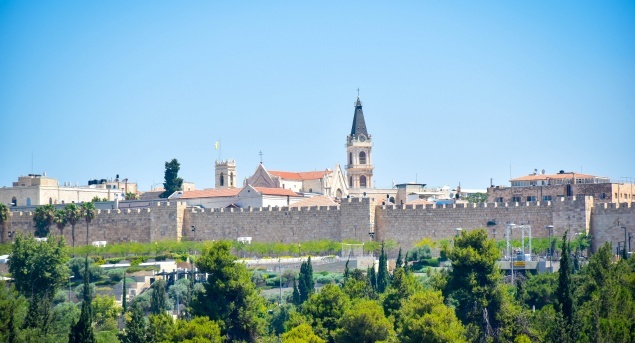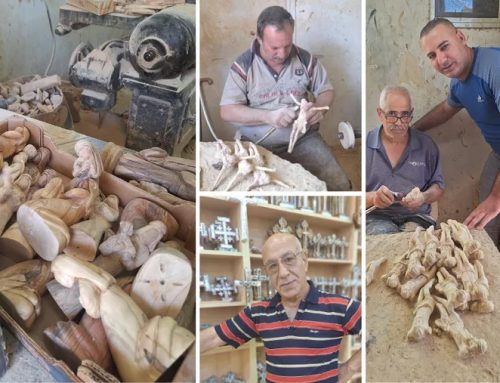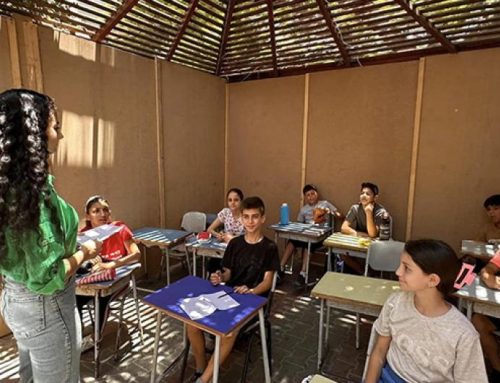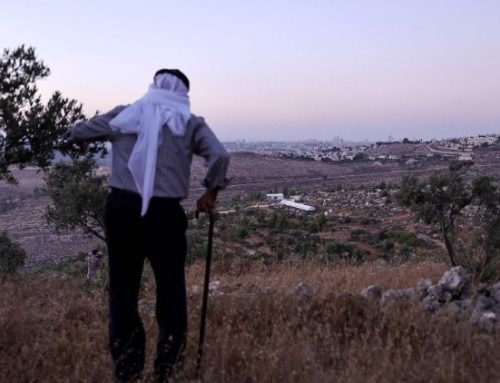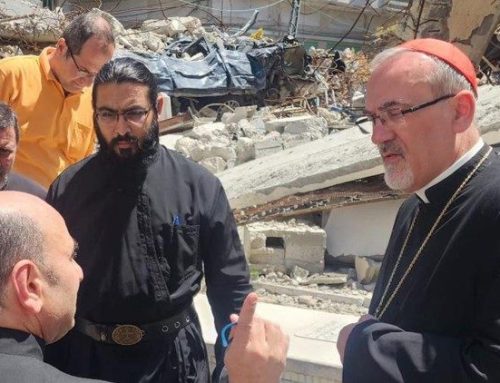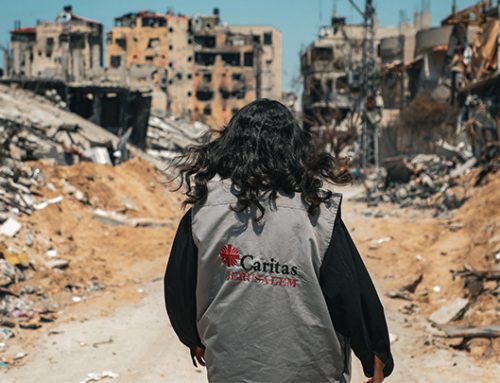To all the priests, consecrated men and women, and faithful
of the Diocese of the Latin Patriarchate of Jerusalem
Dear brothers and sisters,
May the Lord grant you peace!
The General Synod of the Church has been reorganized, in its mode of operation, by the Holy Father, Pope Francis. By starting from local realities, this reorganization aims to create opportunities for meeting, listening, sharing, and planning so as to avoid that the Synod, and the documents it produces, be predominantly a top-down product.
The General Synod of the Church is now structured in three phases and initially involves the local Churches. The first phase is diocesan and provides that each local Church may initiate, from within, dynamics of listening and reflection on the theme of the Synod. The second phase is continental, and aims to gather the thoughts of all the local Churches of the continent in a single text. The last phase will bring back the reflections of the whole universal Church for the meeting of the Synod delegates from all over the world, in Rome, with the Holy Father.
In the Holy Land, at the meeting of Catholic Ordinaries last October 5, we decided that the diocesan phase of the Synod should involve the Catholic Churches as a whole and not separately. In short, we will make a single path of preparation, the same for all our Churches. For the pastoral areas of Galilee and Palestine, Father David Neuhaus, SJ, has been chosen to coordinate the next steps and will be joined by a group of laypeople, religious and priests of all rites, who will help him in this first and vital stage. Father Mody Al-Hindalya of the Melkite Church, who has been appointed in Jordan, and Father Ibrahim Khita of the Maronite Church, whoa has been appointed in Cyprus, will proceed similarly.
The theme proposed for our reflection, “For a synodal Church: communion, participation, mission,” clearly speaks the Holy Father’s intention to ensure that the life of the Church is less and less focused only on the clergy and is increasingly the fruit of a general involvement of all its members. To ensure that all feel in communion with each other and are not considered “objects” of pastoral care prepared by some roundtable commissions. The desire is that there be, in short, full participation in ecclesial life. Such an approach should ensure that the mission, understood as a witness of the Christian life in the Church, becomes genuinely credible. We will then send the fruit of our journey to the Council of Catholic Patriarchs of the Middle East, which will finally send the conclusions for the general meeting of the Synod in Rome.
We are not being asked to prepare long and articulated documents, but rather, a summary of the journey traveled. Let us recall that the purpose of the Synod, and therefore of this consultation, is not to produce documents, but “to plant dreams, draw forth prophecies and visions, allow hope to flourish, inspire trust, bind up wounds, weave together relationships, awaken a dawn of hope, learn from one another and create a bright resourcefulness that will enlighten minds, warm hearts, give strength to our hands” (Preparatory Document, 32).
Parish priests have a critical role in this process, as mediators between the bishops and the people. Therefore, I invite all our parish priests to become protagonists and promote what the Holy Father requests, ensuring that our communities are genuinely involved. I deeply desire that the other diocesan realities also allow themselves to be involved: parishes, men and women religious, contemplative monasteries, seminaries, young people, groups, movements, associations, migrants, foreign workers. All those who feel they have a word to speak should be enabled to do so. Their comments can express gratitude, misunderstanding, encouragement and hope or disappointment, expressions of expectation, desire, and orientation. However, this moment of the synodal journey must not be limited to speaking only of our problems because it would make everything sterile, without perspective. It must be a path illuminated by the Word of God, which is always the bearer of life.
For this reason, we have decided to adopt as an image and methodology the Emmaus disciples or the so-called “Gospel of Emmaus.” Conversing of their problems and about the failure of the Cross, fleeing and finding themselves far from Jerusalem and unaware of Christ, the two disciples find Him waiting for them on the way, without effort on their part. He walks with them and reveals the meaning of the Scriptures, especially concerning the scandal of the Cross. He stops and breaks bread with them and opens their eyes. It is thanks to the presence of Christ in their midst that they become witnesses of the Resurrection.
What, then, could be a method of the Synod for the Patriarchate of Jerusalem?
(1) Going, even physically, to Emmaus – that is to the Places where Christ appeared – and talking about what is not going well. (2) But it is not enough, as I said, to limit ourselves to saying what is wrong, but, as Jesus did for the two disciples of Emmaus, it is vital to connect our life experience to the Scriptures. Thus, we see how these can illuminate the salient facts of life and give a different perspective (the Cross of Christ and my Cross). (3) In this way, we will discover the meaning of the Scriptures regarding the Resurrection of Christ and our lives. (4) We will break the bread there and let Christ bring us back to Jerusalem. (5) To proclaim to the Apostles what has happened to us on the way. The Commissions, led by their respective Regional Coordinators, will soon send everyone a reference text, which will help in synodal reflection with questionnaires and practical guides to facilitate the different dynamics in the various pastoral areas. Of course, this is just a proposal. Other biblical images and methodologies can also be used. What matters is that we meet and listen to each other and that this listening is illuminated by the Word of God and does not remain just a human word.
In general, we are accustomed to interacting, each one in their context of reference: young people with young people, religious with religious, families with families, etc. In my opinion, however, it would be essential to meet at all levels: young people with families, meeting the elderly in hospices, making visits to homes, meeting realities not known before, local parishes with foreigners, foreign workers with the local faithful, and so on. Rather than making theoretical speeches, it is helpful to listen and meet experiences from which to learn: it is more beneficial to go to a monastery and listen to the religious life experience than to make a speech on the religious life. It is more incisive to listen to the life experience of the Holy Land parishioners than to elaborate a fantastic theory about the local Church. Moving even physically from one’s parish hall, from one’s familiar center to meet another unknown reality of one’s Church can, I think, can make a difference in many cases.
We should not expect dramatic changes from all this or extraordinary fruits. The fruits always arrive after a long time and if you have worked in the field. It would already be profitable if the Synod marked the beginning of a new way of finding ourselves as a community, where all feel part of each other’s life, united in the person of Jesus, the heart of our faith, who gives meaning to our being here in the Holy Land and who nourishes and illuminates the love that sustains our lives.
The Synod will officially open in all pastoral areas of the diocese, simultaneously on the same day, October 30, and at the same time, 11 am. For Galilee and Palestine, the opening will take place in Deir Rafat, on the occasion of the Solemnity of Mary Queen of Palestine, for Jordan it will be in the Church of Our Lady of Nazareth in Swefieh (Amman), and for Cyprus at the Maronite Cathedral of Nicosia. It will be a critical and significant moment and I genuinely desire that it be well attended.
Therefore, I invite you all to take part in this critical stage of our Church’s life and the universal Church. I reiterate my invitation to all our priests, parish priests, and numerous pastoral workers to get involved in this new Synod and collaborate with the various coordinators and their respective synodal commissions. We must do it not because we are asked to do so, but because we are sure that it is a beautiful and valuable moment for the life of our Church. In the hope that this journey begun by Pope Francis will rekindle our passion for the Church, with good wishes to all and as I await the opportunity to see you again I invoke the intercession of the Blessed Virgin Mary, Our Lady of Palestine, so that She may accompany us on this way.
Jerusalem October 15th, 2021
Feast of Saint Teresa of Avila
†Pierbattista Pizzaballa
Latin Patriarch of Jerusalem

